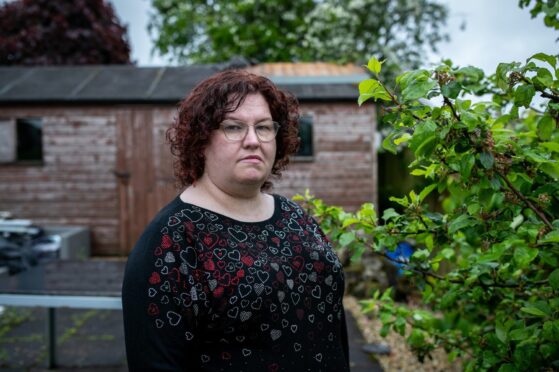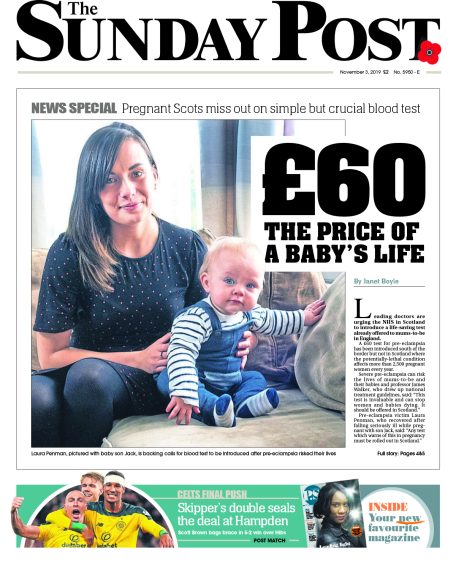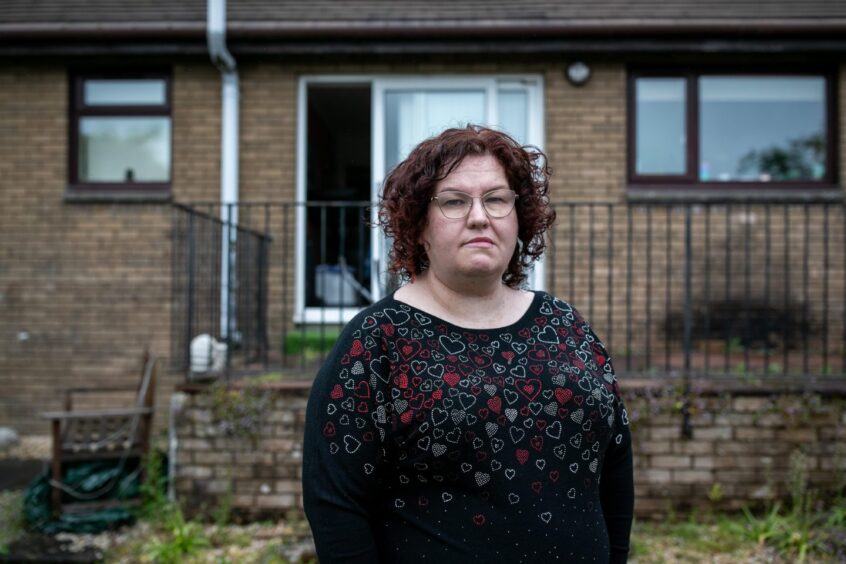
Scottish medical laboratories are struggling to set up a life-saving test for mothers at serious risk in pregnancy.
Early last year the Scottish Government issued directives to health boards to carry out checks for a condition called pre-eclampsia which risks the lives of both mothers and babies.
But leading scientists say funding needed to set up and carry out the tests has not been provided.
The Sunday Post revealed last week that despite a Scottish Government directive to health boards to proceed with the Placental Growth Factor test, none said they routinely offered it to mothers at risk.
One health board – Grampian – said it had no plans to introduce the test, while a number of others said plans had been drawn up, but funding had yet to be allocated.
Dr Allan Wilson, vice president of the UK Institute of Biomedical Science and consultant in NHS Lanarkshire, said: “Funding for the PlGF test is tight.
“The issue with making it available to mothers is that there is not any local funding in Scottish health boards to support the adoption of the test. Money is needed to pay for the test and, in some areas of Scotland, extra equipment.
“The Scottish Health Technologies Group has approved it.”
Pre-eclampsia campaign
John Swinney promised in First Minister’s Questions last week that the Scottish Government had written to health boards to discover if they need more support and would meet with campaigners and the Health Secretary and ensure boards offered the test.
Conservative Women’s Health spokesperson Tess White questioned the serious delay. She became dangerously ill with pre-eclampsia while pregnant with her son, James.
Labour MSP Monica Lennon backed the call and lauded the Sunday Post campaign for the test.
We revealed last week that young mum Lisa Watson almost died five months after the Scottish Government asked health boards to set up the tests. Her baby son, Angus, died after being born prematurely as obstetricians had to deliver him to save his mum’s life.
David Wells, chief executive of the Institute, says that the PlFG test saves lives and NHS money.
“The cost of treating a seriously ill mother and baby and indeed any long-term health consequences to them is outweighed by using the PlGF test. It detects mothers at risk and allows doctors to intervene.
“The problem is that the NHS is run in a way which allows little oversight into true costs. Buying the testing equipment makes compassionate and economic sense. The money is in our health system and it needs wiser administration.”
Tess White revealed the fear and illness pre-eclampsia brings mothers.
“I was seriously ill while expecting my son and it’s shocking that mums are still at risk. I could not face having another baby for fear of losing both our lives next time round. Scotland should do the same as the rest of the UK and many other countries worldwide.”
Around one in 20 of Scotland’s expectant mothers suffer from pre-eclampsia, say the Royal College of Obstetricians and Gynaecologists.
Leading charity Action on Pre-eclampsia revealed the poor access to testing in freedom of information requests to Scottish health boards revealed none offered the test. Many boards cited a lack of funding from the Scottish Government.
APEC CEO Marcus Green said: “It is now in the interest of brave families who have shared their stories that we move forward urgently, get this meeting in the diary and work out how to deliver lifesaving PlGF tests to Scottish mums and babies.”
Our son lived for a month but was too premature to survive. We left hospital and had to prepare his funeral
A mother who has experienced the pain of losing her baby son and the fight to survive serious illness from pre-eclampsia urges the PlGF test to be made available to those at risk.
Lorna Palmer 42, an accountant from Kilmarnock, revealed how her first child Ruaridh had to be delivered just 24 weeks into pregnancy to save her life.
“I had become very ill from pre-eclampsia and the only way to save me was to stop the pregnancy proceeding,” she said.
“My blood pressure was high and obstetricians warned me that Ruaridh had to be delivered that day.
“I had the life-threatening pre-eclampsia condition called hemolysis elevated liver enzymes and low platelets syndrome (HELLP)
“Ruaridh lived for a month but my husband and I were heartbroken that he was too premature to survive.
“We left hospital and had to prepare a funeral for our baby boy and get on with our lives, difficult as that was.
“Despite wonderful support of family and friends, we felt deeply saddened by it all.
“Any medical test which detects mothers and their babies at risk and allows doctors to intervene must be available as soon as possible.”
Lorna became pregnant again with HELLP syndrome at 35 weeks into pregnancy and the couple’s daughter, Iris, 11, was born followed by their son, Gabriel, nine. “We are very lucky to be parents but are very aware of the serious risks pre-eclampsia causes mothers and babies at their most vulnerable time. If medical science has made the breakthroughs to detect and limit those risks, surely mothers should have access.”
Professor James Walker, medical director of Action on Pre-eclampsia and a leading expert in maternal care, said: “Pre-eclampsia is a condition of the placenta and although raised blood pressure can be a symptom, there are others.
“The PlGF test can measure the health of the placenta through a maternal blood test.
“Not only is it a potential lifesaver, but it saves NHS money in ICU and other treatment.
“Early detection gives us several hours’ notice allowing doctors to give mothers steroids to mature their babies’ lungs in preparation for a premature delivery.”
The start of the fight

The last UK General Election was in November 2019.
Tellingly, on the first weekend of the campaign, our front page focused on calls for the introduction of a lifesaving new test for pre-eclampsia.
While the Scottish Government finally approved the PlGF test in March 2023, we revealed last week that no Scottish health board yet offers it to mums-to-be.

Enjoy the convenience of having The Sunday Post delivered as a digital ePaper straight to your smartphone, tablet or computer.
Subscribe for only £5.49 a month and enjoy all the benefits of the printed paper as a digital replica.
Subscribe
 © Andrew Cawley
© Andrew Cawley